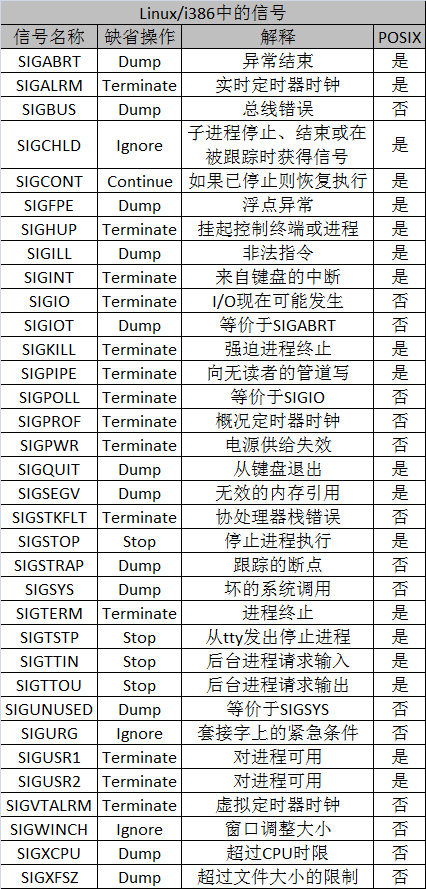以下内容源自Linux 2.6.39内核版本的signal.h(includelinux)文件。记载出便于自己日后查询。
/* * In POSIX a signal is sent either to a specific thread (Linux task) * or to the process as a whole (Linux thread group). How the signal * is sent determines whether it's to one thread or the whole group, * which determines which signal mask(s) are involved in blocking it * from being delivered until later. When the signal is delivered, * either it's caught or ignored by a user handler or it has a default * effect that applies to the whole thread group (POSIX process). * * The possible effects an unblocked signal set to SIG_DFL can have are: * ignore - Nothing Happens * terminate - kill the process, i.e. all threads in the group, * similar to exit_group. The group leader (only) reports * WIFSIGNALED status to its parent. * coredump - write a core dump file describing all threads using * the same mm and then kill all those threads * stop - stop all the threads in the group, i.e. TASK_STOPPED state * * SIGKILL and SIGSTOP cannot be caught, blocked, or ignored. * Other signals when not blocked and set to SIG_DFL behaves as follows. * The job control signals also have other special effects. * * +--------------------+------------------+ * | POSIX signal | default action | * +--------------------+------------------+ * | SIGHUP | terminate | * | SIGINT | terminate | * | SIGQUIT | coredump | * | SIGILL | coredump | * | SIGTRAP | coredump | * | SIGABRT/SIGIOT | coredump | * | SIGBUS | coredump | * | SIGFPE | coredump | * | SIGKILL | terminate(+) | * | SIGUSR1 | terminate | * | SIGSEGV | coredump | * | SIGUSR2 | terminate | * | SIGPIPE | terminate | * | SIGALRM | terminate | * | SIGTERM | terminate | * | SIGCHLD | ignore | * | SIGCONT | ignore(*) | * | SIGSTOP | stop(*)(+) | * | SIGTSTP | stop(*) | * | SIGTTIN | stop(*) | * | SIGTTOU | stop(*) | * | SIGURG | ignore | * | SIGXCPU | coredump | * | SIGXFSZ | coredump | * | SIGVTALRM | terminate | * | SIGPROF | terminate | * | SIGPOLL/SIGIO | terminate | * | SIGSYS/SIGUNUSED | coredump | * | SIGSTKFLT | terminate | * | SIGWINCH | ignore | * | SIGPWR | terminate | * | SIGRTMIN-SIGRTMAX | terminate | * +--------------------+------------------+ * | non-POSIX signal | default action | * +--------------------+------------------+ * | SIGEMT | coredump | * +--------------------+------------------+ * * (+) For SIGKILL and SIGSTOP the action is "always", not just "default". * (*) Special job control effects: * When SIGCONT is sent, it resumes the process (all threads in the group) * from TASK_STOPPED state and also clears any pending/queued stop signals * (any of those marked with "stop(*)"). This happens regardless of blocking, * catching, or ignoring SIGCONT. When any stop signal is sent, it clears * any pending/queued SIGCONT signals; this happens regardless of blocking, * catching, or ignored the stop signal, though (except for SIGSTOP) the * default action of stopping the process may happen later or never. */
如下为Linux/i386中的常规信号:
